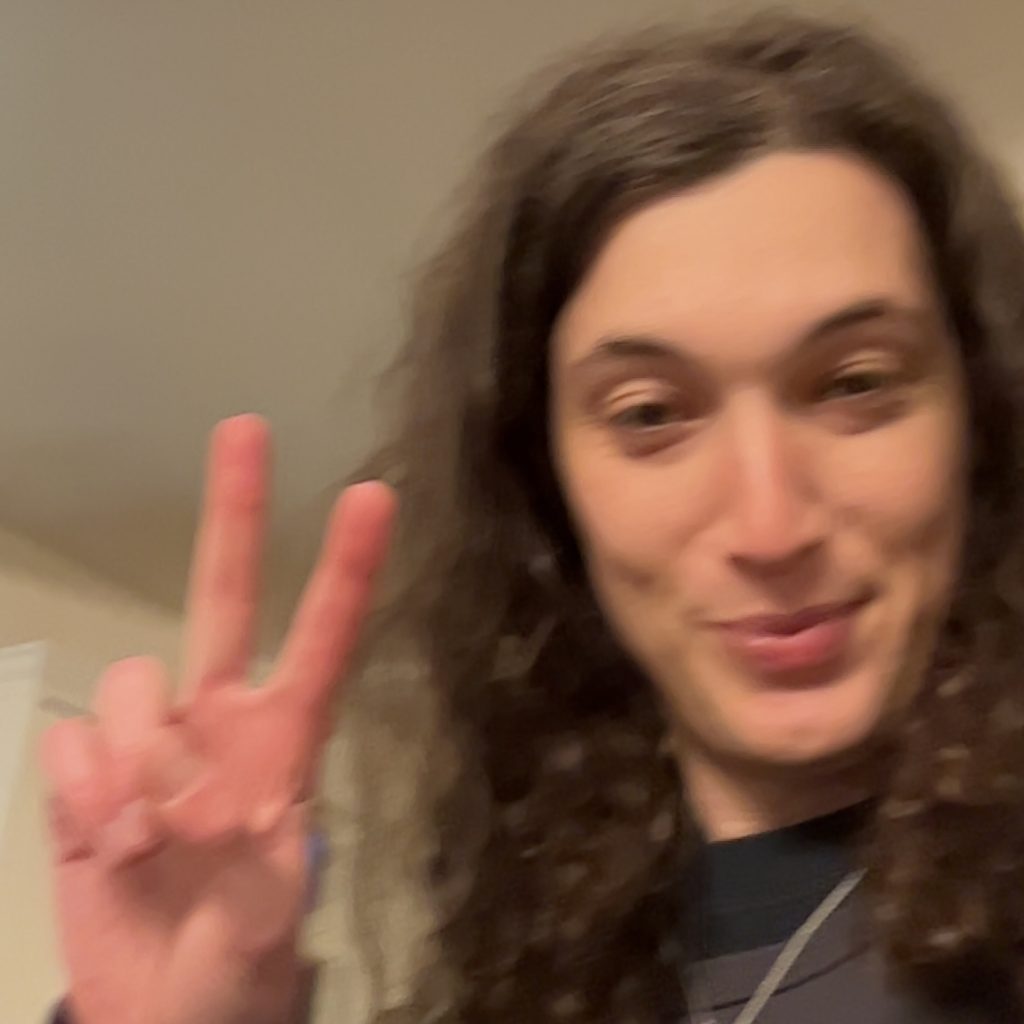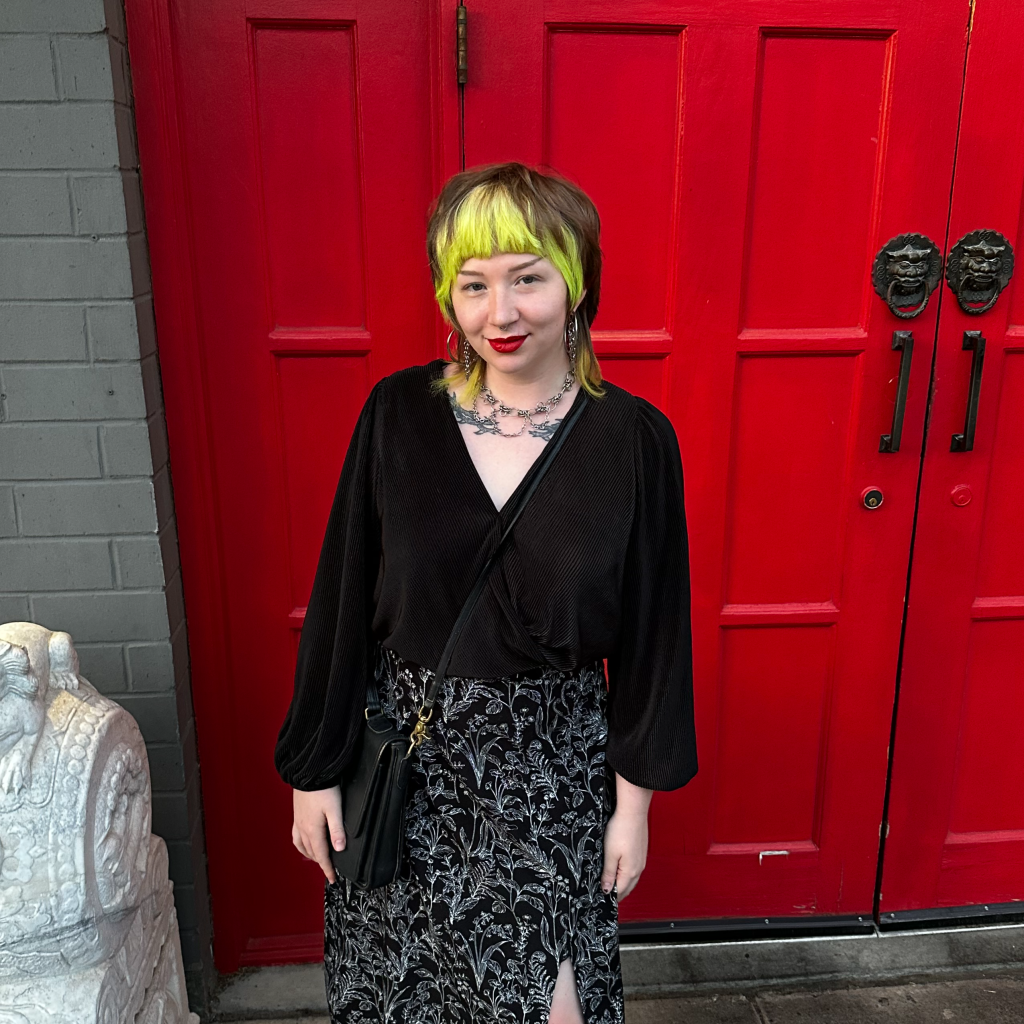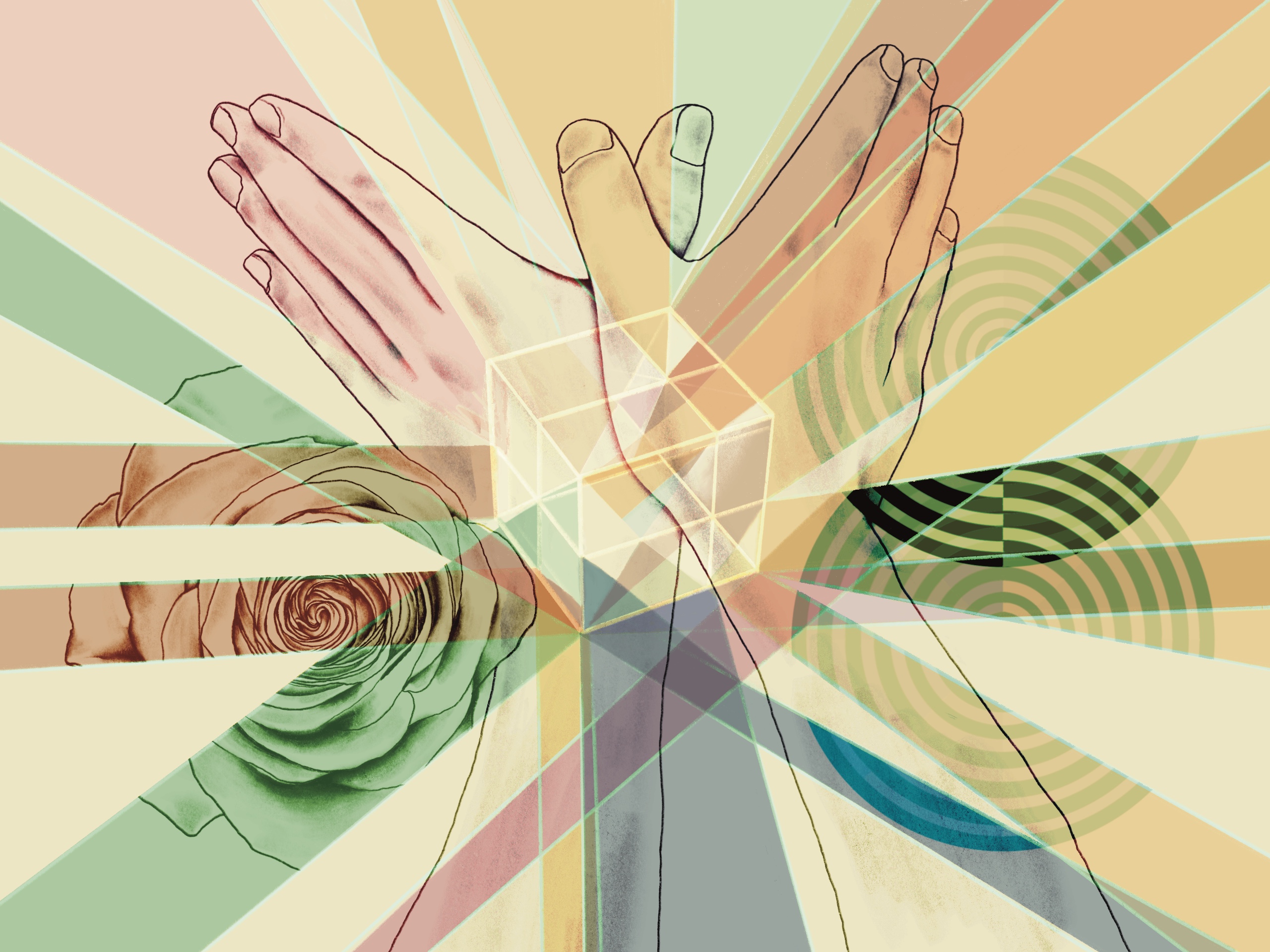I read Girlfriends by Emily Zhou in early August of 2023, a couple weeks before filling my first estrogen prescription. I had a hunch that, once I began taking my medicine, my life would soon unfold like a plot from this collection of short stories (maybe one left on the cutting room floor). Like the girls in these pages, I made story-selves in my writing, I had a body, and I wondered if these selves were ever in conflict or in harmony. I was never sure.
Like the girls in Zhou’s collection, I smoked a lot of weed and I had sex in ways that were new to me during the first few months of transition; I made a trans life for myself where I live, and felt stuck in my past self any time I went back home; I fretted and wondered about looks I got as I went about my day. Stimuli expected and surprising drew me at once into and away from my flesh. I wondered if my interior could possibly catch up to the confidence with which I represented transness in my work.
Reading this collection, I felt the presence of a deceptively simple, but deep-rooted truth: different stages of transition beget different dramas in every trans girl’s life, in how she sees herself and how that self-perception clashes and gels with her social circle. Estrogen feels like nothing at first, and then it feels like everything. Zhou captures the peculiar intensity of the trans quotidian better than any writer I’ve encountered in recent memory. She does this by freshly combining literary trends and influences both contemporary and historical into a fresh style that feels just as indebted to Casey Plett, one of her publishers, as it does to Henry James.
I conducted this interview with Emily Zhou via email from September to November of 2023. In this introduction, I knew that I’d want to represent myself as trans in a plainspoken, subject-verb way, not through the artifices of my playwriting and screenwriting work. It’s taken me some time to work up the courage.
But the timing to publish something on Emily Zhou isn’t so bad. Since our email exchange, Emily has gone on to win the 2024 Leslie Feinberg Award for Trans and Gender-Variant Literature from Publishing Triangle. She was a finalist for the 2024 Lambda Literary Award for Best Transgender Fiction. And she has recently joined the editorial team of LittlePuss Press, the trans-run publisher that put out her book.
This interview has been lightly edited and condensed for clarity and concision.
Elliot Schiff: How did you think about these stories in relation to each other when working on Girlfriends?
Emily Zhou: I wasn’t thinking about it as a book project at first. The summer after I finished college, I was writing stories and sharing them with my followers on Twitter as practice. I had assumed that my first book would be years in the future, and this was just me testing out material and trying on voices. When LittlePuss got started, the poet Stephen Ira nudged me to submit what I had so far as a partial manuscript. To my total surprise, they accepted it and told me to write more stories to fill it out. I had written the first drafts of the “practice” stories really quickly, but it took me nearly two years to write the other four stories and revise what I had already written.
In retrospect, what ties it together is just that the scenarios of the stories, and the people who populate them, are recognizable from my own life. The book is a product of the thinking and living and associating I’ve been doing for the two years it took for me to write it. The stories are set in places I’ve lived or spent time in—Ann Arbor, Ypsilanti, the faux-bohemian areas of Brooklyn and Queens—and they all have a general theme of early-adulthood uncertainty and experimentation.
ES: Many of the central characters of these stories are quiet observers who at a moment’s notice become key actors in an interconnected web of dramas. It feels as if the characters and the work are thematizing a struggle to reconcile the personal and the social. Did a tension show up for you in the urge to write socially versus personally? If so, how?
EZ: As a trans writer, I’m writing from inside a subculture in a way that straight writers usually aren’t. I’m not just representing individual trans women—I’m representing the world they live in, the ways they do or do not fit into it. I don’t know if the stories “thematize” this per se, but I do think queer people have a comparatively heightened sense of how they do or do not fit into this nebulous idea of the “queer community,” whether that means some broad philosophical concept or the lived-in social worlds of specific places.
Naturally, some of that anxiety gets into my writing, and it affects me as a writer too. Early in the editing process, Cat Fitzpatrick pointed out to me that there were only a couple moments in the whole manuscript where two trans women talk to each other. (This was before I had written the New York stories or “Gap Year.”) It’s easier to write about a lone trans woman running the gauntlet of the cis world alone than it is to write about vigorous, peopled queer communities because those dynamics are often so idiosyncratic. Sometimes, fiction about trans people has been criticized on this basis: for not getting it “right” or for not including everyone in the picture. My own experience is necessarily partial, so it’s a real worry that I might be treating my queer characters as dumbed-down tropes in the same way that cis, straight writers do.
While I don’t write autobiographically, I think these pressures have led me to write about characters who are like people I reliably encounter socially and can understand on the basis of my own experience. “Means To An End,” for example, was inspired by a third-hand anecdote I heard about a trans woman living with her college TA. (My impression is that they got along a lot better than Leonora and Nadine.) I didn’t know the people involved, but I had some idea of what that might be like, and it led to the story.
ES: Let’s talk about “Means to an End” a little more. Throughout your collection, you draw associations between transness, reading and writing, and consciousness connected to and alienated from the body. The sex scene between Leonora and Violet in “Means to an End” felt like the climax of the collection regarding this web of themes. Can you speak on this association I’m picking up on, and how you see this moment, and Leonora, in relation to it?
EZ: Early transition is a sort of disembodied time in general. Your body is going through all these surreal changes, you don’t feel pretty enough, you’re having mood swings, you have to explain yourself to people, etc. A lot of this book sort of hangs out in that space. I found it interesting to write about because it’s psychologically unique to trans people. You get a few years into this process and you’re like anyone else.
Older trans people can be sort of intoxicating to younger ones—proof that it “works.” I was trying to work with this feeling in “Means To An End.” That Leonora is a writer is coincidental, at least on the level of my conscious intention. I write about writers because I’ve always known writers, or people who wanted to write and aren’t sure how to get into it. If there’s a connection there, it’s that Leonora has the same kind of insecurities about her erudition that she has about her womanhood. The joke of Violet asking Leonora about her name—she asks her if she named herself named after the Surrealist writer and painter Leonora Carrington, and Leo says “no”—is that Violet immediately assumes a level of sophistication that Leonora aspires to, but doesn’t feel like she really quite belongs to. It’s easy to see how that same feeling of frustrated ambition applies to her transition—she wants to be a confident, adult woman in the way that she thinks Violet is. The problem with wanting to be like someone else is that it gets in the way of being what you are, and that’s the problem that Leonora faces in the story and eventually surmounts once Violet disappoints her.
ES: How was pub day? How are you feeling now that the book is out?
EZ: I’m really glad the book is out in the world! It’s gotten write ups in a few small magazines and newspapers, and a few people have expressed interest in what I’m going to do next. I’ve been doing a few readings in different (mostly east coast) cities, and seeing trans women around my age who read it and connected in some way with it—it’s kind of surreal, honestly. That’s the aspect about it I’ve been the most excited about because it shows that I’m reaching the right people.
ES: How do you see the relationship between what you read and what you write?
EZ: Reading is something I do automatically. I don’t think I’ve ever not been in the middle of a book since my early teens. When I write, it doesn’t feel like I have conscious access to everything I’ve read, but it’s there. After I’m done writing, I’m able to go, oh, that’s what I’m borrowing from Mary Gaitskill, or whoever. Usually descriptive strategies, ways of laying out a scene, sometimes more overt references. In the moment, I’m not as aware of where it comes from, but it all comes from somewhere. Whenever I try to consciously “model” myself after any given writer it’s usually a disaster.
ES: You mention peers above—how do peer relationships function in your writing practice?
EZ: I never took fiction writing classes in school and I’m sort of not sure I would have functioned super well in that kind of environment. A lot of the feedback I got on early drafts of Girlfriends was from other trans women I’m close friends with—some of them writers, some of them not. It’s good to have trans writer friends because the problems I come across while writing are problems specific to writing about trans people, but at the same time I want them to be able to see what I’m trying to do through a literary lens.
Sometimes I run drafts by my trans friends to make sure I’m not going off the rails and writing something ill-considered. When I sent a few friends an early draft of “Ponytail,” the feedback I was looking for was ultimately whether the interrogation at the very end of the story was cruel, or felt false. I think I knew from the moment I finished the story that it “worked” as fiction—but I genuinely wasn’t sure whether it would piss off every single trans woman who read it. Ultimately, I left it in.
Girlfriends by Emily Zhou was published by Little Puss Press on October 17, 2023. You can purchase it directly from the publisher here or from your local bookshop here.

About the author: Elliot Schiff is a playwright, screenwriter, and comedian based in Chicago. I’m Not Here to Make Friends, their debut full production, debuted in Chicago at Links Hall in 2023 (Dir. Shea Leavis). You can read more about it in Sixty here. They are currently working towards their MFA in Writing for the Stage and Screen at Northwestern University.

About the illustrator: Summer Mills is a printmaker, illustrator, and graphic designer from Chicago. Her work is inspired by the art nouveau movement, religious/spiritual imagery and concepts, music, and various types of literature. For her, the enjoyment of creation is the patience and trust it requires her to practice.



